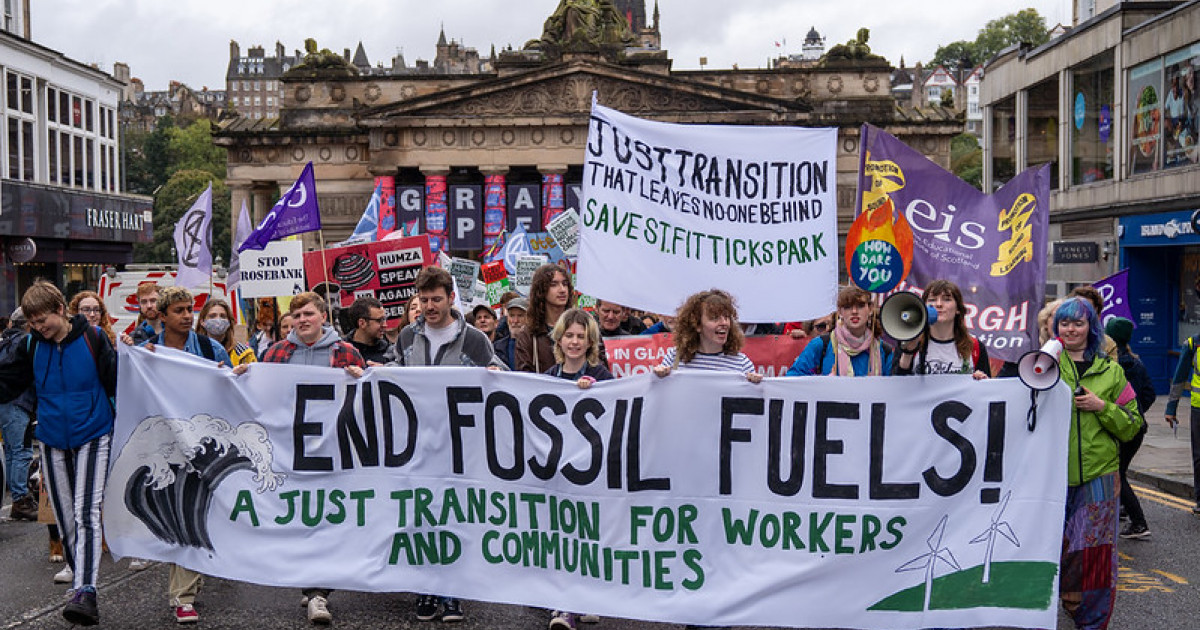Climate change won't wait for pieces to fall into place
Scottish Greens co-leader Patrick Harvie, in his capacity as Minister, spoke at the Scottish Renewables Heat Summit where he raised the spectre of culture wars and a UK Government deliberately sabotaging climate action. Read his speech in full.

I am sure today and on many other such days you will get immersed in policy detail. Evidence, testing, analysis, discussion – the essential foundations of lasting change.
For the scale of what we need to do today, on climate action and on the great heat transition, we have work to do on technology and innovation, on finance, on skills and workforce capacity, and on getting the regulation right to support all those elements and drive up demand.
But underpinning all of that is something deeper. It’s a matter of what we stand for – and by ‘we’ I mean all of us: Government, nationally and locally, our partners in the industry and the experts who advise us, but wider society too, our whole population.
Because everyone will be part of this urgent transition from the fossil fuel age to a way of living and working that lives within the limits of our planet’s eco-systems; the systems on which we all depend and the breakdown of which poses the greatest threat we have ever faced.
That threat is environmental, and it’s also an economic one. Our reliance on fossil fuels is a source of immense vulnerability. It makes us reliant on turbulent international markets, through a resource that’s often used as a geopolitical weapon by brutal dictators, and it throws our lowest income citizens onto a roulette wheel of fuel poverty and debt.
We have made great strides here in Scotland: halving our emissions in recent decades. Scotland is widely seen internationally as a leader in climate action.
But the hardest bit is still ahead and the Climate Change Committee has warned that there is a lot to do to if Scotland is to translate targets and leadership into delivery.
And it’s incredibly troubling that at a time when we are more aware of this planetary emergency than ever before, better-informed than ever before about the impacts that are already hitting hard we have to acknowledge that right at the same time we see a resurgence of climate denial, climate delay, and politically opportunistic backlash against climate action.
Over the last 12 months we have seen the climate crisis being deliberately dragged into the frontline of what people often call ‘culture wars’.
Here in Scotland we have seen quite deliberate sabotage, by a UK Government, of action to boost recycling which would have helped us cut emissions and plastic pollution.
In London, action to improve air quality became the target of shallow gamesmanship in a parliamentary by-election, in the wake of which similar efforts in other cities have been ditched.
And throughout the UK, the idea that we might move away from heating our homes through fossil fuels to doing so by modern efficient electrical means – powered by renewables: has been characterised by those who should know better as the stuff of so-called “eco-zealots”.
Even though so many other European countries are forging ahead with just such a transition, and investing in the skills and the industries which can make it happen.
The people who pursue this kind of “culture war” politics are indifferent to the subject. One day they’ll be undermining social protection for marginalised minorities. The next day they’ll be railing against changes in schooling.
And all too often, they’ll framing climate action as solely an attack on personal freedom: by which they mean the freedom to keep making the problem worse.
So we need to be clear in saying not only that the heat transition is necessary, not only that it can be achieved, but that it’s an opportunity to liberate people from dependence on fossil fuels, from volatile bills, from fuel poverty, and from the sense of powerlessness so many people feel in the face of the climate emergency and the immeasurable harm it threatens.
Setting out the benefits of the heat transition in this way will help to bring people with us, instead of leaving them feeling that it’s something being done to them.
And that’s essential, because whatever the actions of Government and industry, it will need everyone’s involvement, and everyone’s commitment to a sustainable energy future.
That’s the only way we’ll achieve what we have to do. And what we have to do, is a lot. Our statutory target means reducing emissions from homes and buildings In Scotland by two-thirds by 2030.
How do we do that?
In two ways. By reducing the demand for heat in our homes; and by changing the way we heat those homes.
Let’s take demand reduction first of all. That means continuing to accelerate our efforts to improve energy efficiency of homes.
We have said in our Heat in Buildings Strategy that we want all homes to reach the equivalent of EPC C by 2033. Better insulated buildings are critical to our battle on fuel poverty and making sure that every unit of energy generation we get onto the grid is used as efficiently as possible.
But better insulation on its own isn’t enough. Not nearly enough. To do what we need to do on emissions we need to change the way we heat homes. From gas and oil to climate friendly systems.
We’ve spent far too long building in a way that just leaves us with ever more retrofit jobs waiting to happen.
That is why, if Parliament approves our proposals, our New Build HeatStandard will make sure that, as of April, all new buildings seeking a building warrant will need to install zero direct emissions heating from
the outset.
Some developers aren’t waiting for next April and are already doing this as standard, presenting to their customers a home which is future-proofed against retrofit for a long time.
At the same time, building standards continue the journey towards a Passivhaus equivalent, reducing energy demand and energy bills.
But, of course, it would take us well into the next century if we relied on new build alone. We don’t have that long.
So dealing with the homes and buildings we have is the critical challenge. That means all of our homes and all of our buildings on zero emissions heating no later than 2045. The market alone, consumer demand alone, cannot achieve that level of transition.
Demand for climate friendly heating is rising but not nearly at the pace needed.
Here in Scotland that demand is supported by the most generous grant scheme for zero direct emissions heating in the UK. But the scale of market-led action is still far behind where we need to get to.
Everywhere I have been over the last two years in my role as Minister, suppliers and installers tell me that government needs to give clarity and certainty over the long term on the heat transition.
That is what provides the confidence to invest in capacity, workforce, skills – the building blocks of a growing heat sector which will support thousands of high value jobs.
That is why the Heat in Buildings Bill which we will deliver during this session of Parliament is the centre-piece of our ambitions.
As our Programme for Government last week set out, we will consult on that proposals for that Bill as soon as we are able and set out a regulatory framework that will drive the development of heat networks and adoption of zero emission heating systems.
At scale.
As we have seen over the last couple of months, that won’t win instant or universal acclaim. We have work to do to make sure the need for and appetite for that transition is understood and embraced. And we have to
do that work when the UK Government is failing to match our ambition.
- A UK government which is presiding over an energy market which still hasn’t decoupled the pricing of electricity and gas, which everyone knows is critical to making zero-emissions heating more affordable to run.
- A UK government which retains the powers over fiscal and borrowing levers which other countries take for granted, and which would help Scotland finance this transition
- A UK government which is stalling on the issue of placing requirements on suppliers to install zero emissions heating
- And a UK government which repeatedly fails to engage with us over improvements to household support schemes.
I know that some people will try to represent this as a mutual failure of co-operation – but I assure you that’s not for the want of trying.
For over a year we proposed a simpler, more flexible approach to the UK schemes for household support in Scotland, changes which wouldn’t have undermined any of the UK’s policy goals but which would have
enabled a better fit with the schemes we run.
Our proposals were simply ignored by the UK Government. As a result, neither ECO nor the Warm Home Discount scheme are effectively targeting fuel poverty as it affects vulnerable households and communities across Scotland.
So, if I was standing here with the same powers as my Swedish or Danish counterparts, nothing would give me greater pleasure than being able to outline how the Government will every tool in box, to address the
challenge we all face. I can’t do that yet. Not yet.
But of course the UK Government, as with all governments, also has the climate clock ticking. So, if and when the UK Government does finally commit to these and other necessary actions, and produces a detailed
timetable for decarbonising buildings, that will have a positive effect in Scotland as well, helping us to achieve our level of ambition.
It's a point I will be repeating with my UK counterparts when we meet later today.
However, climate change won’t wait for all of those pieces to fall into place, and that is why Scotland must continue to lead the way, as much as we can meantime with the powers that we do have.
So we know what we need to do.
It’s what the evidence tells us. It’s what other countries in the same position are wrestling with too. But knowing that won’t change the fact that those who oppose this action do have a ready platform.
Some objections will be based on genuine fears or misgivings on which government should reflect and respond.
Others will be the rearguard action of those still wedded to the status quo, determined to delay, dilute and deflect.
We will hear myths and misrepresentations - that heat pumps don’t work in Scotland – that it’s too cold, ignoring the fact that their use is growing fastest in other northern countries – Norway, Sweden, Estonia - which are colder than Scotland.
We will be told that we should wait for new technologies to become viable, in particular, that hydrogen will ride to the rescue.
Hydrogen will, almost certainly be big part of our future economy and our wider energy system, especially in industry, transport, and perhaps in energy storage but at a time when even the UK Government is cooling on the role of hydrogen for heat, you’d be hard pressed to find a critical mass of informed people who believe that hydrogen is the main way in which we will heat buildings in the future.
Some people might even tell us that we should wait for the UK Government to lead the way; that Scotland shouldn’t aim to go any faster or do anything differently.
We have heard this before.
Only a few months ago the UK Government used its powers under the Internal Market Act to fatally undermine Scotland’s plans for a deposit return scheme, saying that Scotland must align with a UK scheme that doesn’t even exist yet and with each passing week seems further away in UK ministers’ plans.
There IS, as the Climate Change Committee and others have rightly said, a huge amount to be gained by more effective working between the governments across the UK nations. I do hope that the context changes,
and our efforts to achieve that are met with more willingness.
But cooperation mustn’t mean that we all settle on the lowest common denominator, going at the pace of the slowest, especially when that pace is glacial or even in reverse.
We will also be told we don’t have the workforce or the skills.
Now, there ARE huge challenges in equipping Scotland with the workforce and skills for the transition but we can’t afford to simply treat that as an immovable barrier – the Government needs to set the conditions which drive up investment in skills and capacity.
Our Heat in Buildings Bill will be that clear, lighthouse signal to the industry that Scotland is serious on this
agenda.
And we will be told that the heat transition highlights an urban / rural divide. That the challenges of rural properties – older, poorer quality, remote from the gas grid – amplify the difficulties of the heat transition.
Let me be clear – there are distinctive ways in which we need to reflect rural circumstances, and I can assure you today that we will do exactly that.
At the same time, rural areas are most disadvantaged by the way we heat our homes today – so the opportunities to get it right will yield even higher benefit.
These are some of the arguments we will hear. Some genuine and in good faith. We need to address those.
Others steeped in climate denial, or climate delay. We need to confront those head on.
As the need for the heat transition becomes clearer and as what it means in practice becomes more apparent, the counter-arguments will mount.
I am proud to be part of a government which is clear about the choices before us and the need for leadership at this time.
Which, on climate action, knows where to stand. Getting the policy detail right is hugely important – the heat transition must be undertaken but there are choices about how.
That is why we will soon outline and seek views on proposals for how we will regulate.
Our Green Heat Finance Task Force will publish the first of two reports outlining how public and private finance can work together to ensure that households and businesses are supported to make the transition.
We will launch our revamped version of Warmer Homes Scotland, an important element of the £1.8 billion package of support we have committed over the course of this Parliament.
Our Heat in Buildings Supply Chains Delivery Plan will continue to set out the practical steps we are taking to support the growth of the green heat sector, including our ongoing work with the sector to identify and
address any gaps in training provision or support.
These are all important policy avenues. I hope you will continue to engage with them.
If you are an installer or supplier, tell us what would provide the certainty you need to train, expand and invest
If you are an investor tell us what would make the heat transition an attractive prospect for investment
But we need inspiration and the confidence to bring people with us, as much as we need the right details on policy.
For everyone here today I want you all to feel empowered to be ambassadors for this great transition. You are the experts, you have the authority to speak, yours are the voices that need to be heard.
Fifty years ago many of our homes were heated by burning lumps of black rock on a metal grate and watching much of the heat vanish up the chimney.
Now most of us have homes that are heated by pumping gas through pipes and burning that.Today is very different to the past, and the future will be very different to today. In ten, twenty years you will all look back at having been part of making the heat transition happen.
The pace at which that happens, the scale, the alignment with tackling fuel poverty and delivering high value jobs – that depends on winning the arguments, building the evidence and reflecting on feedback.
I want you all to be part of that movement and to shout it from the rooftops.
I look forward to working with you all in doing just that.



